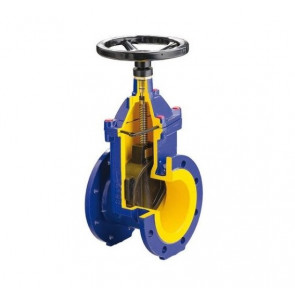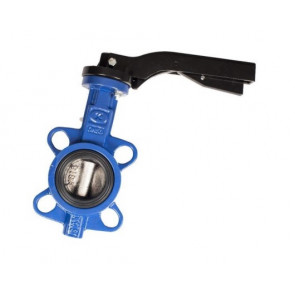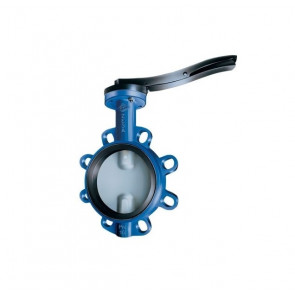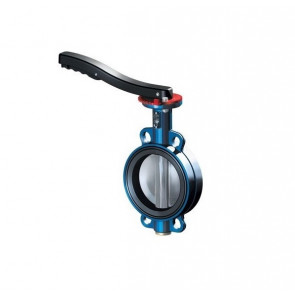Valves
-
Flanged gate valve with rubberized wedge ZETKAMA 111 DN40-DN300
Starting at: ₴5,182.50
-
Rotary valve "Butterfly" with stainless disc ZETKAMA DN50-DN300
Starting at: ₴2,262.50
-
Butterfly valve ARI-ZESA 22.012 DN25 - DN500
Starting at: ₴2,555.00
-
Butterfly valve ARI-ZIVA 22.014 DN25 - DN600
Starting at: ₴4,805.00
WEDGE VALVE, BUTTERFLY VALVE, BUTTERFLY VALVE
VALVE - a type of pipeline fittings, which is used to regulate or shut off the working environment.
VALVE TYPES
1) Wedge gate valve - blocks the flow of the working medium with a wedge, which is located in the valve body. The Teploterm company offers wedge gate valves with a rubberized wedge, which are widely used in water supply and fire extinguishing systems. Also, our company can offer gate valves for high-pressure pipelines with metal-to-metal seals.
2) Butterfly valve, butterfly valve - blocks the flow of the working medium with a valve that is fixed on the valve stem and moves around its axis. The Teploterm company offers different types of butterfly valves: ARI-Ziva and ARI-Zesa butterfly (Germany), Zetkama butterfly (Poland), etc.;
3) Gate valve, knife gate valve - blocks the flow of the working medium with a gate valve (knife). Very often, a gate valve is called a knife gate valve.
FIELD OF VALVES APPLICATION
Gate valves are mainly used to block the flow of the working medium, that is, in the "open-closed" mode, less often gate valves are used to control flow. For example, butterfly valves are recommended to be used only with a minimum difference in the working environment, before and after the valve. The butterfly valve has found wide application in housing and communal services, on water supply pipelines, including industrial ones, etc. Single and double-disc wedge gate valves with metal-to-metal seals are used on steam supply pipelines, including high-pressure steam pipelines, on gas/fuel lines, etc. Knife gate valves are used in the pulp and paper industry, waste systems and many other process pipelines.
CLASSIFICATION OF VALVES
According to the material of the valve body, the valves are classified:
- - Steel gates. The valve body is made of cast steel, depending on the working environment and parameters, the valve body can be made of different steel, including stainless steel;
- - Cast iron gates. The valve body is made of cast iron, including the valve body made of ductile iron;
- - Brass latches. The valve body is made of brass. Such gate valves of small diameters are used in domestic piping systems, and there are also industrial brass gate valves that are used in shipbuilding on pipelines with sea water.
Gate valves are classified according to the type of gate:
- - Wedge valve. Gate valve has a wedge shape with two seats, which are located at an angle. The wedge valve may have a rubber wedge or a metal-to-metal seal;
- - Gate valve. The gate valve is made in the form of a gate / knife and works on the principle of a guillotine;
- -Butterfly valve. The butterfly valve shutter is fixed on the valve stem and moves around its axis;
- - Double disc valve. The shutter of a double-disk gate valve consists of two flat disks located parallel to each other.
According to the movement of the stem (spindle), valves are of two types:
- - Gate valve with rising spindle . The screw pair of the gate valve is located outside the body and does not come into contact with the working medium. When the valve is opened, the stem rises by the value of the valve opening. When mounting the valve, it is necessary to provide free space for the convenience of turning the handwheel (valve flywheel);
- - Gate valve with non-rising spindle. The valve screw pair is located inside the valve body and is in direct contact with the working medium. In the open and closed state, the height of the valve remains unchanged, which makes it possible to mount valves with a non-rising stem in places with a limited service area.
Gate valves are classified according to the type of connection:
- - Threaded latch. It is connected to the pipeline through a threaded connection, this type of valve connection is common in pipelines of small diameters;
- - Flanged valve. Joins the pipeline through flange connection according to various standards (DSTU, DIN, ANSI). This type of connection of valves to the pipeline is the most common;
- - Wafer gate valve. The gate valve is installed between the flanges and pulled together with studs. This type of connection is mainly used for butterfly valves;
- - Gate valve for welding. The ends of the valve are chamfered for subsequent welding to the pipeline. This type of connection is used on pipelines with a high pressure of the working medium.
By type of valve seat seal:
- - Soft seal. The place of shutting off the flow of the working medium in the valve provides a soft seal. These include rubber wedge gate valves, EPDM sealed butterfly valves, NBR sealed butterfly valves, Viton sealed butterfly valves, etc.;
- - Metal-to-metal seal. The place of shutting off the flow of the working medium in the valve has a solid solid metal seal. Such seals are common in double eccentric butterfly valves, triple eccentric butterfly valves and other valves.
Gate valves are classified according to the method of control:
- - Gate valves with manual control. In such valves, closing and opening is performed using manual force (rotation of the handwheel, handwheel or handle);
- - Gate valves with electric drive. In such valves, on the platform along the axis of the rod, an electric drive is installed with electricity supplied to it to control the opening or closing of the valve;
- - Valves with pneumatic drive. In such gate valves, a pneumatic drive with compressed air supplied to it is installed on the platform along the axis of the stem to control the opening or closing of the gate valve.





